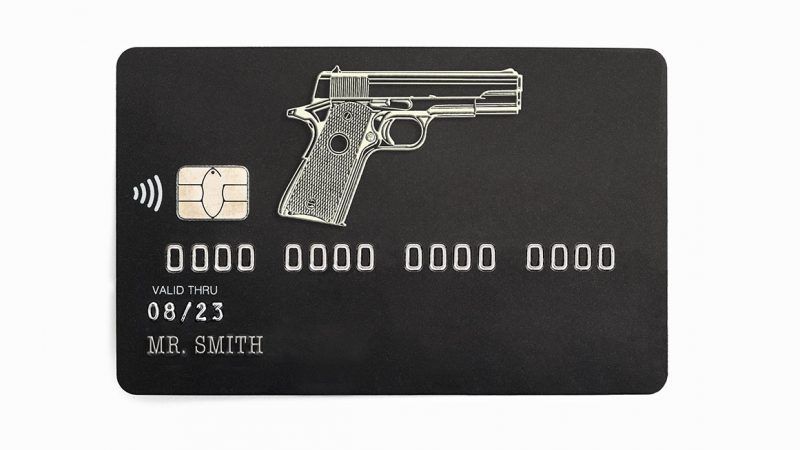Should Banks Be in the Gun Control Business?
There is no easy way to determine whether someone is spending a lot on guns because they like guns or because they plan to commit an act of terror.

A new federal gun control bill calls for banks and credit card companies to provide transaction data to the feds on some firearms purchases.
The Gun Violence Prevention Through Financial Intelligence Act, introduced by Rep. Jennifer Wexton (D–Va.), would require the Financial Crimes Enforcement Network (FinCEN) to "request information from financial institutions for the purpose of developing an advisory about the identification and reporting of suspicious activity." The bill's aim is to identify a consistent purchasing pattern among people who buy firearms and firearm accessories in order to conduct "lone wolf acts of terror."
"Banks, credit card companies, and retailers have unique insight into the behavior and purchasing patterns that can help identify and prevent mass shootings," Wexton explained in a statement. "The red flags are there—someone just needs to be paying attention."
The New York Times reports that Wexton's bill was inspired in part by a 2018 investigation by Times columnist Andrew Ross Sorkin. Sorkin reported that in at least eight of the 13 mass shootings that had killed 10 or more people since the Virginia Tech massacre in 2007, the perpetrators used credit cards to finance their killing sprees. James Holmes, who killed 12 people at a movie theater in Aurora, Colorado, in 2012, used a credit card to purchase more than $11,000 worth of guns, grenades, and other military gear. Omar Mateen, the 2016 Pulse nightclub shooter in Orlando, Florida, ran up $26,532 in charges across six credit card accounts in the 12 days leading up to his attack.
Visa spokesperson Amanda Pires rightly told The New York Times last year that expecting "payment networks to arbitrate what legal goods can be purchased sets a dangerous precedent."
Past attempts by the government to identify "red flags" for illegal activity by analyzing transaction data have resulted in banks casting "as wide a net as possible." In their efforts to identify human traffickers, for instance, financial institutions have flagged such innocuous behaviors as running up large grocery bills and renting DVDs in bulk.
Almost half of gun owners report possessing at least four guns, and as with many other hobbies, it's easy to spend a great deal of money on gun-related products. There is no easy way to determine whether someone is spending a lot on guns because they like guns or because they plan to commit an act of terror. It's not hard to imagine law-abiding gun owners coming under suspicion should Wexton's bill become law.
